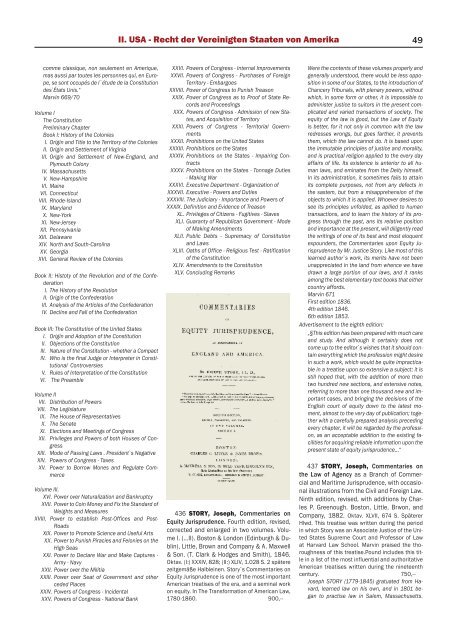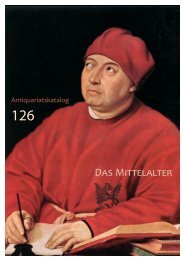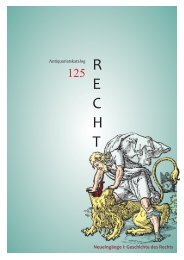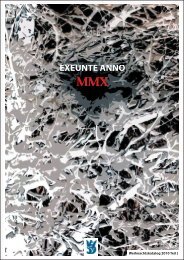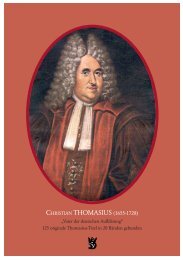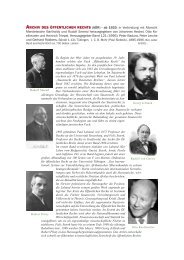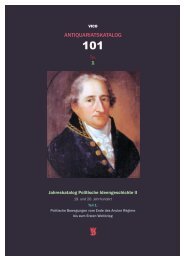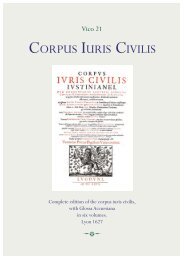Antiquariatskatalog Rechtswissenschaften Deutschland Europa und ...
Antiquariatskatalog Rechtswissenschaften Deutschland Europa und ...
Antiquariatskatalog Rechtswissenschaften Deutschland Europa und ...
Erfolgreiche ePaper selbst erstellen
Machen Sie aus Ihren PDF Publikationen ein blätterbares Flipbook mit unserer einzigartigen Google optimierten e-Paper Software.
comme classique, non seulement en Amerique,<br />
mas aussi par toutes les personnes qui, en Europe,<br />
se sont occupés de l`étude de la Constitution<br />
des`États Unis.“<br />
Marvin 669/70<br />
Volume I<br />
The Constitution<br />
Preliminary Chapter<br />
Book I: History of the Colonies<br />
I. Origin and Title to the Territory of the Colonies<br />
II. Origin and Settlement of Virginia<br />
III. Origin and Settlement of New-England, and<br />
Plymouth Colony<br />
IV. Massachusetts<br />
V. New-Hampshire<br />
VI. Maine<br />
VII. Connecticut<br />
VIII. Rhode-Island<br />
IX. Maryland<br />
X. New-York<br />
XI. New-Jersey<br />
XII. Pennsylvania<br />
XIII. Delaware<br />
XIV. North and South-Carolina<br />
XV. Georgia<br />
XVI. General Review of the Colonies<br />
Book II: Histoty of the Revolution and of the Confederation<br />
I. The History of the Revolution<br />
II. Origin of the Confederation<br />
III. Analysis of the Articles of the Confederation<br />
IV. Decline and Fall of the Confederation<br />
Book III: The Constitution of the United States<br />
I. Origin and Adoption of the Constitution<br />
II. Objections of the Constitution<br />
III. Nature of the Constitution - whether a Compact<br />
IV. Who is the final Judge or Interpreter in Constitutional<br />
Controversies<br />
V. Rules of Interpretation of the Constitution<br />
VI. The Preamble<br />
Volume II<br />
VII. Distribution of Powers<br />
VIII. The Legislature<br />
IX. The House of Representatives<br />
X. The Senate<br />
XI. Elections and Meetings of Congress<br />
XII. Privileges and Powers of both Houses of Congress<br />
XIII. Mode of Passing Laws . President`s Negative<br />
XIV. Powers of Congress - Taxes<br />
XV. Power to Borrow Mones and Regulate Commerce<br />
Volume III.<br />
XVI. Power over Naturalization and Bankruptcy<br />
XVII. Power to Coin Money and Fix the Standard of<br />
Weights and Measures<br />
XVIII. Power to establish Post-Offices and Post-<br />
Roads<br />
XIX. Power to Promote Science and Useful Arts<br />
XX. Power to Punish Piracies and Felonies on the<br />
High Seas<br />
XXI. Power to Declare War and Make Captures -<br />
Army - Navy<br />
XXII. Power over the Militia<br />
XXIII. Power over Seat of Government and other<br />
ceded Places<br />
XXIV. Powers of Congress - Incidental<br />
XXV. Powers of Congress - National Bank<br />
II. USA - Recht der Vereinigten Staaten von Amerika<br />
XXVI. Powers of Congress - Internal Improvements<br />
XXVII. Powers of Congress - Purchases of Foreign<br />
Territory - Embargoes<br />
XXVIII. Power of Congress to Punish Treason<br />
XXIX. Power of Congress as to Proof of State Records<br />
and Proceedings<br />
XXX. Powers of Congress - Admission of new States,<br />
and Acquisition of Territory<br />
XXXI. Powers of Congress - Territorial Governments<br />
XXXII. Prohibitions on the United States<br />
XXXIII. Prohibitions on the States<br />
XXXIV. Prohibitions on the States - Impairing Contracts<br />
XXXV. Prohibitions on the States - Tonnage Duties<br />
- Making War<br />
XXXVI. Executive Department - Organization of<br />
XXXVII. Executive - Powers and Duties<br />
XXXVIII. The Judiciary - Importance and Powers of<br />
XXXIX. Definition and Evidence of Treason<br />
XL. Privileges of Citizens - Fugitives - Slaves<br />
XLI. Guaranty of Republican Government - Mode<br />
of Making Amendments<br />
XLII. Public Debts - Supremacy of Constitution<br />
and Laws<br />
XLIII. Oaths of Office - Religious Test - Ratification<br />
of the Constitution<br />
XLIV. Amendments to the Constitution<br />
XLV. Concluding Remarks<br />
436 STORY, Joseph, Commentaries on<br />
Equity Jurisprudence. Fourth edition, revised,<br />
corrected and enlarged in two volumes. Volume<br />
I. (...II). Boston & London (Edinburgh & Dublin),<br />
Little, Brown and Company & A. Maxwell<br />
& Son. (T. Clark & Hodges and Smith), 1846.<br />
Oktav. (I:) XXXIV, 828; (II:) XLIV, 1.028 S. 2 spätere<br />
zeitgemäße Halbleinen. Story`s Commentaries on<br />
Equity Jurisprudence is one of the most important<br />
American treatises of the era, and a seminal work<br />
on equity. In The Transformation of American Law,<br />
1780-1860. 900,--<br />
49<br />
Were the contents of these volumes properly and<br />
generally <strong>und</strong>erstood, there would be less opposition<br />
in some of our States, to the introduction of<br />
Chancery Tribunals, with plenary powers, without<br />
which, in some form or other, it is impossible to<br />
administer justice to suitors in the present complicated<br />
and varied transactions of society. The<br />
equity of the law is good, but the Law of Equity<br />
is better, for it not only in common with the law<br />
redresses wrongs, but goes farther, it prevents<br />
them, which the law cannot do. It is based upon<br />
the immutable principles of justice and morality,<br />
and is practical religion applied to the every day<br />
affairs of life. Its existence is anterior to all human<br />
laws, and eminates from the Deity himself.<br />
In its administration, it sometimes fails to attain<br />
its complete purposes, not from any defects in<br />
the sastem, but from a misapprehension of the<br />
objects to which it is applied. Whoever desires to<br />
see its principles unfolded, as apllied to human<br />
transactions, and to learn the history of its progress<br />
through the past, ans its relative position<br />
and importance at the present, will diligently read<br />
the writings of one of its best and most eloquent<br />
expo<strong>und</strong>ers, the Commentaries upon Equity Jurisprudence<br />
by Mr. Justice Story. Like most of this<br />
learned author`s work, its merits have not been<br />
unappreciated in the land from whence we have<br />
drawn a large portion of our laws, and it ranks<br />
among the best elementary text books that either<br />
country affords.<br />
Marvin 671<br />
First edition 1836.<br />
4th edition 1846.<br />
6th edition 1853.<br />
Advertisement to the eighth edition:<br />
„§This edition has been prepared with much care<br />
and study. And although it certainly does not<br />
come up to the editor`s wishes that it should contain<br />
everything which the profession might desire<br />
in such a work, which would be quite impracticable<br />
in a treatise upon so extensive a subject: it is<br />
still hoped that, with the addition of more than<br />
two h<strong>und</strong>red new sections, and extensive notes,<br />
referring to more than one thousand new and important<br />
cases, and bringing the decisions of the<br />
English court of equity down to the latest moment,<br />
almost to the very day of publication; together<br />
with a carefully prepared analysis preceding<br />
every chapter, it will be regarded by the profession,<br />
as an acceptable addition to the existing facilities<br />
for acquiring reliable information upon the<br />
present state of equity jurisprudence...“<br />
437 STORY, Joseph, Commentaries on<br />
the Law of Agency as a Branch of Commercial<br />
and Maritime Jurisprudence, with occasional<br />
illustrations from the Civil and Foreign Law.<br />
Ninth edition, revised, with additions by Charles<br />
P. Greenough. Boston, Little, Brwon, and<br />
Company, 1882. Oktav. XLVII, 674 S. Späterer<br />
Hlwd. This treatise was written during the period<br />
in which Story was an Associate Justice of the United<br />
States Supreme Court and Professor of Law<br />
at Harvard Law School. Marvin praised the thoroughness<br />
of this treatise.Po<strong>und</strong> includes this title<br />
in a list of the most influential and authoritative<br />
American treatises written during the nineteenth<br />
century. 750,--<br />
Joseph STORY (1779-1845) gratuated from Havard,<br />
learned law on his own, and in 1801 began<br />
to practise law in Salem, Massachusetts.


